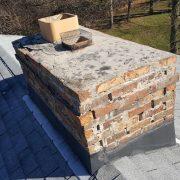How to Get Rid of Birds in Your Chimney
Many people assume that the constant chirping and racket coming from their chimney is the sound of bats. While this is a common source of chimney chirps, the notorious chimney swift is more likely to be the culprit, especially in summer. These migratory birds are protected in the United States under the Migratory Bird Act of 1918, so killing them outright is not an option, nor would any compassionate person want to do so. The best way to get rid of chimney swifts is to prevent them from nesting in your chimney in the future.
- Confirm that the source of the chirping is, in fact, chimney swifts. These birds migrate north from Peru between June and September. They build their nests inside chimneys when there are no hollow trees available. Watch the outside of your chimney at dusk to make sure they are not bats.
- Try to scare the birds away. Bang some pots and pans in your fireplace and create lots of noise. This isn’t the kindest way to remove the birds nor the most effective, but it is legal. Removing them by physical force or purposefully destroying their nests is not.
- If you are insistent on removing the birds, contact a bird rehabilitation center in your area. You should be able to work something out with them to remove the birds without killing them. Baby birds are very vulnerable and those that fall from their nest into the fireplace should be brought to a wildlife protection service right away.
- Contact a chimney sweep. Wait until the birds are gone and hire a professional to clean out the remaining nest debris. This should cost somewhere between $75 and $100.
- Have a screen installed in the top of your chimney to prevent future nesting. This is the only reliable way to rid your chimney of these birds. The installation and materials should cost somewhere between $100 and $700 per chimney, depending on the materials used, the height of the roof, etc.
- Warn your neighbors about the chimney swifts. As soon as the birds see that your chimney is blocked, they will look for the closest available chimney to nest in the following year.






